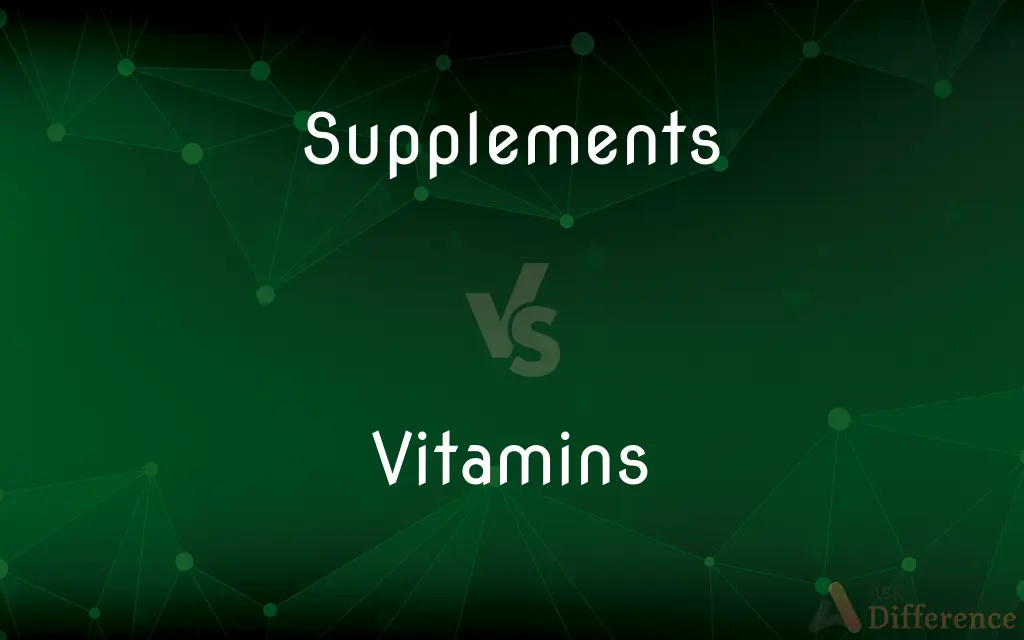Supplements vs. Vitamins — What's the Difference?
By Tayyaba Rehman — Published on December 10, 2023
Supplements are products taken to boost dietary intake of specific nutrients or compounds, while vitamins are organic compounds essential for normal growth and body functions.

Difference Between Supplements and Vitamins
Table of Contents
ADVERTISEMENT
Key Differences
Supplements are diverse products designed to enhance or complete a person's diet. They can range from minerals, amino acids, fatty acids, to herbal products. On the other hand, vitamins are specific organic compounds that the body requires in trace amounts for optimal health.
Supplements are typically consumed when a person's diet is lacking or when certain health conditions necessitate increased intake of certain nutrients. Vitamins, as a subset of supplements, can be naturally found in various foods and are critical for a host of biological processes.
While supplements might contain vitamins, they can also contain a myriad of other ingredients. Vitamins, however, are solely the individual compounds, like Vitamin C or Vitamin D, which are paramount for health.
When choosing supplements, it's essential to understand the vitamins and other ingredients they may contain to ensure they fit an individual's needs.
Comparison Chart
Definition
Products to enhance or complete dietary intake
Organic compounds essential for growth and bodily functions
ADVERTISEMENT
Origin
Can be synthetic, mineral-based, or derived from natural sources
Typically naturally occurring but can be synthetically produced
Examples
Protein powders, herbal extracts, fish oil
Vitamin A, Vitamin C, Vitamin D, Vitamin E, Vitamin K
Primary Use
Address dietary deficiencies, support health, or enhance diet
Required in trace amounts for normal metabolic functions
Forms Available
Pills, powders, capsules, liquids, gels
Pills, capsules, liquids, found naturally in foods
Compare with Definitions
Supplements
Supplements enhance or complete dietary intake.
She took iron Supplements to address her deficiency.
Vitamins
Vitamins support numerous physiological functions.
Vitamin C is known to support immune function.
Supplements
Supplements can contain minerals, herbs, or amino acids.
The store offers various herbal Supplements for wellness.
Vitamins
Vitamins can be fat-soluble or water-soluble.
Vitamin D is fat-soluble, while Vitamin C is water-soluble.
Supplements
Supplements are often taken to support specific health needs.
After workouts, he uses protein Supplements for muscle recovery.
Vitamins
Vitamins are often found naturally in various foods.
Leafy greens are rich in several essential Vitamins.
Supplements
Supplements might include a combination of vitamins and other ingredients.
The multivitamin Supplements contain a blend of vitamins and minerals.
Vitamins
Vitamins can be synthesized for supplemental purposes.
Many people take Vitamin B12 in supplemental form as it's limited in vegetarian diets.
Supplements
Supplements can be found in various forms like pills or powders.
Fish oil Supplements come in soft gel capsules.
Vitamins
Vitamins are organic compounds essential for the body.
Vitamins are critical for overall health and wellness.
Supplements
Something added to complete a thing, make up for a deficiency, or extend or strengthen the whole.
Vitamins
Any of various fat-soluble or water-soluble organic substances that are essential in minute amounts for normal growth and activity of living organisms. They are synthesized by bacteria and plants and are obtained by animals chiefly in their diet.
Supplements
A section added to a book or document to give further information or to correct errors.
Vitamins
A preparation containing one or more vitamins, often taken as a dietary supplement.
Supplements
A separate section devoted to a special subject inserted into a periodical, such as a newspaper.
Vitamins
Plural of vitamin
Supplements
See dietary supplement.
Supplements
See supplementary angle.
Supplements
To provide or form a supplement to.
Supplements
Plural of supplement
Supplements
Infl of supplement
Common Curiosities
What are Supplements?
Supplements are products designed to enhance or complete one's dietary intake.
Can I take Supplements without a doctor's recommendation?
It's best to consult a healthcare professional before starting any Supplements.
Why are Vitamins important for the body?
Vitamins play crucial roles in various physiological functions and metabolic processes.
Can Supplements replace a balanced diet?
No, Supplements are meant to complement, not replace, a balanced diet.
How do Vitamins differ from other Supplements?
Vitamins are specific organic compounds essential for health, while Supplements can contain a variety of ingredients, including vitamins.
Do all Supplements contain Vitamins?
No, Supplements can contain a range of ingredients, including minerals, herbs, and amino acids. Only some have vitamins.
What's the difference between water-soluble and fat-soluble Vitamins?
Water-soluble Vitamins aren't stored in the body, while fat-soluble ones are stored in fats.
Can Supplements help with medical conditions?
Some Supplements may help manage specific conditions, but it's crucial to consult a healthcare provider.
Are all Supplements safe to consume?
While many Supplements are safe, it's essential to do research and consult a healthcare provider.
Can Vitamins be harmful in excessive amounts?
Yes, excessive intake of certain Vitamins can be toxic or harmful.
Are there regulations governing the production of Vitamins and Supplements?
Yes, in the US, the FDA regulates Vitamins and Supplements, but they are not subjected to the same rigorous testing as drugs.
How many Vitamins are essential for humans?
There are 13 essential vitamins required for human health.
How do I know if I need Supplements?
A healthcare provider can provide guidance on Supplement needs based on individual health and dietary intake.
Are Vitamins found naturally in foods?
Yes, Vitamins are naturally present in various foods, though some are also synthetically produced for Supplements.
What should I consider when choosing Supplements?
Look at ingredient lists, dosages, potential allergens, and consult a healthcare expert.
Share Your Discovery

Previous Comparison
MPG vs. MP4Author Spotlight
Written by
Tayyaba RehmanTayyaba Rehman is a distinguished writer, currently serving as a primary contributor to askdifference.com. As a researcher in semantics and etymology, Tayyaba's passion for the complexity of languages and their distinctions has found a perfect home on the platform. Tayyaba delves into the intricacies of language, distinguishing between commonly confused words and phrases, thereby providing clarity for readers worldwide.













































